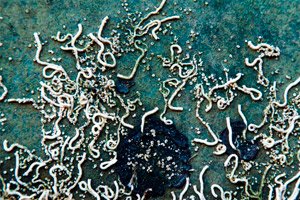
All iLive content is medically reviewed or fact checked to ensure as much factual accuracy as possible.
We have strict sourcing guidelines and only link to reputable media sites, academic research institutions and, whenever possible, medically peer reviewed studies. Note that the numbers in parentheses ([1], [2], etc.) are clickable links to these studies.
If you feel that any of our content is inaccurate, out-of-date, or otherwise questionable, please select it and press Ctrl + Enter.
New family of compounds shows promise in treating parasitic worms
Last reviewed: 02.07.2025
 ">
">An international team of researchers led by the University of Toronto has discovered a family of natural compounds with the potential to create new and more effective treatments for parasitic worms. These compounds block a unique metabolic process that the worms use to survive in the human gut.
Soil-borne parasitic worms wreak havoc in developing countries in the tropics. Infection with these parasites causes malaise, weakness, malnutrition and other debilitating symptoms and can cause birth defects in children and impair their growth.
Soil-borne parasitic worms infect more than one billion people worldwide, mostly in poor communities in developing countries that lack comprehensive health and sanitation systems. The parasites are becoming less susceptible to the few available antihelminthic drugs, so finding new compounds is urgently needed.
Taylor Davie, first author of the study and a graduate student at the Donnelly Centre for Cellular and Biomolecular Research at the University of Toronto
The study was published today in the journal Nature Communications.
Many species of parasitic worms spend most of their life cycle inside a human host. To adapt to the gut environment, especially the lack of oxygen, the parasite switches to a type of metabolism that depends on a molecule called rhodoquinone (RQ).
The parasite can survive inside its human host for many months using an RQ-dependent metabolism.
The research team decided to target the parasitic worm's adaptive metabolic process because RQ is only present in the parasite's system; humans do not produce or use RQ. Therefore, compounds that can regulate the production or activity of this molecule would selectively kill the parasite without harming the human host.
The researchers screened natural compounds isolated from plants, fungi, and bacteria on the model organism C. elegans. Although not a parasite, this worm also depends on RQ for metabolism when oxygen is not available.
"This is the first time we've been able to look for drugs that specifically target the unusual metabolism of these parasites," said Andrew Fraser, the study's principal investigator and a professor of molecular genetics at the Donnelly Center and the Temerty School of Medicine.
"This screen was made possible by recent advances by our group and others in using C. elegans to study RQ-dependent metabolism, as well as our collaboration with RIKEN, one of Japan's largest research agencies. We screened their remarkable collection of 25,000 natural compounds, leading to the discovery of a family of benzimidazole compounds that kill worms dependent on this type of metabolism."
Researchers are proposing a multi-dose regimen of a newly discovered family of compounds to treat parasitic worms. While single-dose treatment is more convenient for mass drug treatment programs, a longer treatment program would be more effective in killing the parasites.
"We are very pleased with the results of the study for which we used our library," said Hiroyuki Osada, a professor of pharmacy at Shizuoka University and director of the chemical biology group at the RIKEN Center for Sustainable Resources.
"The study demonstrates the power of the screening approach, which allows researchers in this case to screen very large numbers of molecules within a concentrated collection of natural products. Screens are very efficient, which is key to addressing urgent research questions of global significance such as this."
Next steps for the research team include refining the new class of inhibitors through additional in vivo testing with parasitic worms, to be conducted by Kaiser's lab at the University of Basel in Switzerland, and continuing to search for compounds that inhibit RQ.
"This study is just the beginning," Fraser said. "We've found several other very potent compounds that affect this metabolism, including, for the first time, a compound that blocks the worms' ability to produce RQ. We hope our screens will help develop drugs to treat major pathogens around the world."
This research was supported by the Health Institutes of Canada and the European Molecular Biology Organization.
